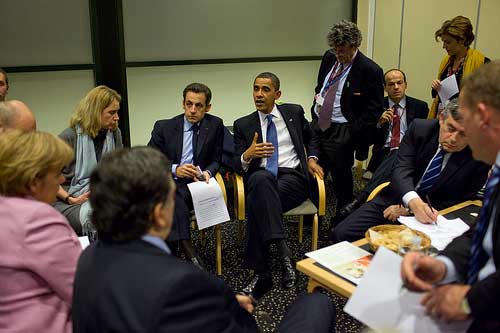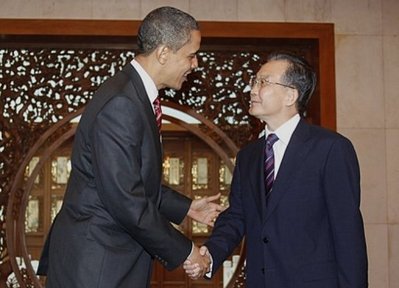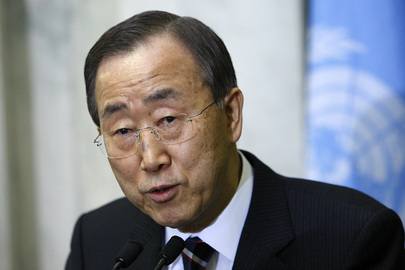.jpg) Concluding the week before Christmas, the Copenhagen Conference on Climate Change was no gift to small islands and countries with low lying coastlands.
Concluding the week before Christmas, the Copenhagen Conference on Climate Change was no gift to small islands and countries with low lying coastlands.
What emerged from it was a political accord rather than the much talked about legal agreement that would bind all countries to tackling climate change that has its most calamitous effects on small developing countries.
The political accord itself was highly contentious. Drafted and agreed by only five countries, it was only “noted” by the Conference; it was not adopted as reflecting global consensus and it attracted vociferous opposition.
From the Caribbean, Camillo Gonsalves, St Vincent & the Grenadines Ambassador to the United Nations was particularly scathing. He is reported by the Caribbean Media Corporation as saying: “St. Vincent and the Grenadines feels no less threatened today than we did when Copenhagen began”. He expressed the hope that the next climate change conference, scheduled for Mexico later this year, will be marked by “openness, inclusivity, transparency and legitimacy.”
 G7 Leaders at Copenhagen could not shift China
G7 Leaders at Copenhagen could not shift China
At Copenhagen despite the facade of a huge conference room with thousands of representatives of nations from around the world, the big players engaged in their usual excusive discussions and then handed down their agreement which, even amongst themselves, was tortuously reached.
The difference this time is that the big players were not the Western industrialized nations. The big boys were China, India, Brazil, and South Africa with the United States of America.
The tides of history are washing-up a new order on the shores of international decision-making for sure. But, while the new order includes the large developing countries, the smaller ones continue to be marginalised, remembered more as a postscript than as a priority even though they are the primary sufferers.
It is significant that the large developing countries in the new club have so far shown no greater concern for the plight of small and vulnerable countries than did the G7.
In part, this points to a failure of diplomatic action by small developing states themselves. Under the umbrella of the Association of Small Island States (AOSIS) at the United Nations, they work assiduously among themselves to reach consensus positions, but the governments of these countries have not adopted a joined-up policy in their relations with the four large developing states.
Hence, in their individual relations with Brazil, India, China and South Africa, Caribbean governments, for instance, have not adopted a cohesive policy in which diplomatic support for these four, as well as trade with them, is linked to issues such as climate change.
Similarly, the governments of AOSIS have made no high level, joint approach to the big four developing countries spelling out the challenges and problems that climate change causes them. Yet, together, and with a joined-up policy, they would command some attention. Individually, they are simply picked off and silenced.
It was significant that during the Copenhagen conference, the Prime Minister of Tuvalu, whose country is gravely imperilled by sea-level rise, claimed at a press conference that “there are some countries like Australia who have been trying to arrange a meeting with us to probably water down our position on 1.5 degrees Celsius. We did not attend that meeting, but I heard from other small islands that Australia was trying to tell them if they agree to the 2 degrees limit, money would be on the table for adaptation process.”
But, the real problem with dealing meaningfully with Climate Change boils down to the attitude of the United States and China – neither of whom want any dramatic restraints on their emissions of greenhouse gasses.
 US President Obama and China's Wen Jiabao
US President Obama and China's Wen Jiabao
In the case of the Obama administration, it is constrained both by US industrial giants and the consumption habits of the American people. Imposing rapid change upon them would have severe political consequences particularly for Obama if he adopted an aggressive stance. There are already so many influential groups in the US who question his leadership that he would give them ready ammunition to fire at him if he moved more quickly than the political traffic can bear.
With regard to China, despite the fact that it has become an economic powerhouse in the world, millions of its people still live in poverty. Both they and Chinese industry still rely on inefficient and unclean energy sources to improve living standards and production even though China is investing hundreds of millions of dollars in clean energy. China is unlikely to agree to heavy constraints on its development, arguing with some validity that the industrialised countries, already developed, have brought the world to this sorry pass and it is they who must make the biggest reductions.

Ban ki-moon, the UN Secretary-General, did his job by trying to put a brave face on the Copenhagen political accord pointing particularly to a pledge of US$30 million a year between 2010 and 2012 to be disbursed through a Copenhagen Green Climate Fund. He also pointed to pledges to mobilize US$100 billion a year by 2020 for developing countries.
No developing country should hold its breath that anything approaching these sums will be disbursed. And they certainly will not be disbursed to small states unless there is vigorous and collective global campaigning by the member countries of AOSIS.
The great tragedy of Copenhagen is that, even while the jousting between the US and China continues, the large developed and developing countries did not seize the moment to at least provide help to those islands and developing countries with low-lying coasts. Had they agreed an immediate, well-resourced plan of action to help those small countries, such as Tuvalu and Maldives, Copenhagen could have been remembered for its humanity.
 Maldives President at Copnhagen
Maldives President at Copnhagen
But, at least one Caribbean Community and Common Market (CARICOM) country can claim some success at Copenhagen. Guyana has adopted a strategy of preserving its forests so as to contain greenhouse gas emissions in return for development money. A plan, excluded from the Kyoto Protocol entitled Reduced Emissions from Deforestation and Degradation (REDD) — under which wealthier nations pay rainforest countries for preserving their trees, was specifically mentioned in the political accord.
That mention is a platform on which to build. Belize, Dominica and Jamaica which still have relatively substantial rainforests should join Guyana in capitalizing on it.
Copyright reserved by Sir Ronald Sanders